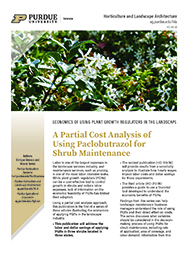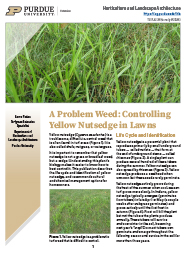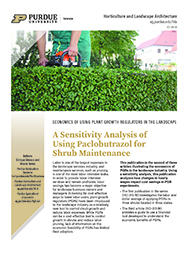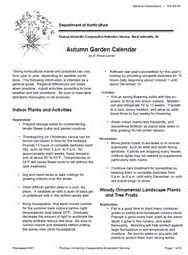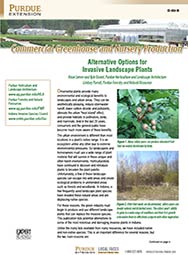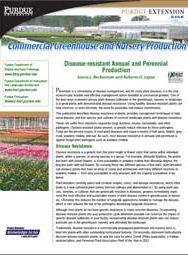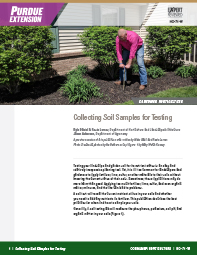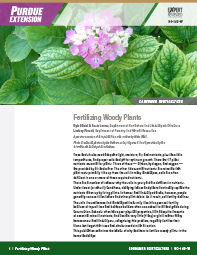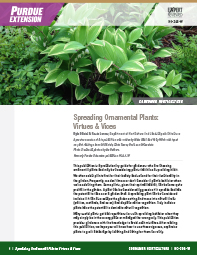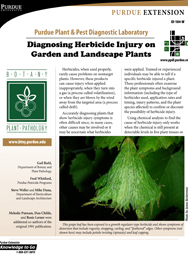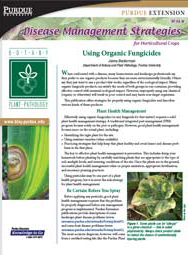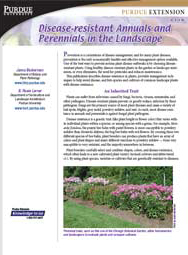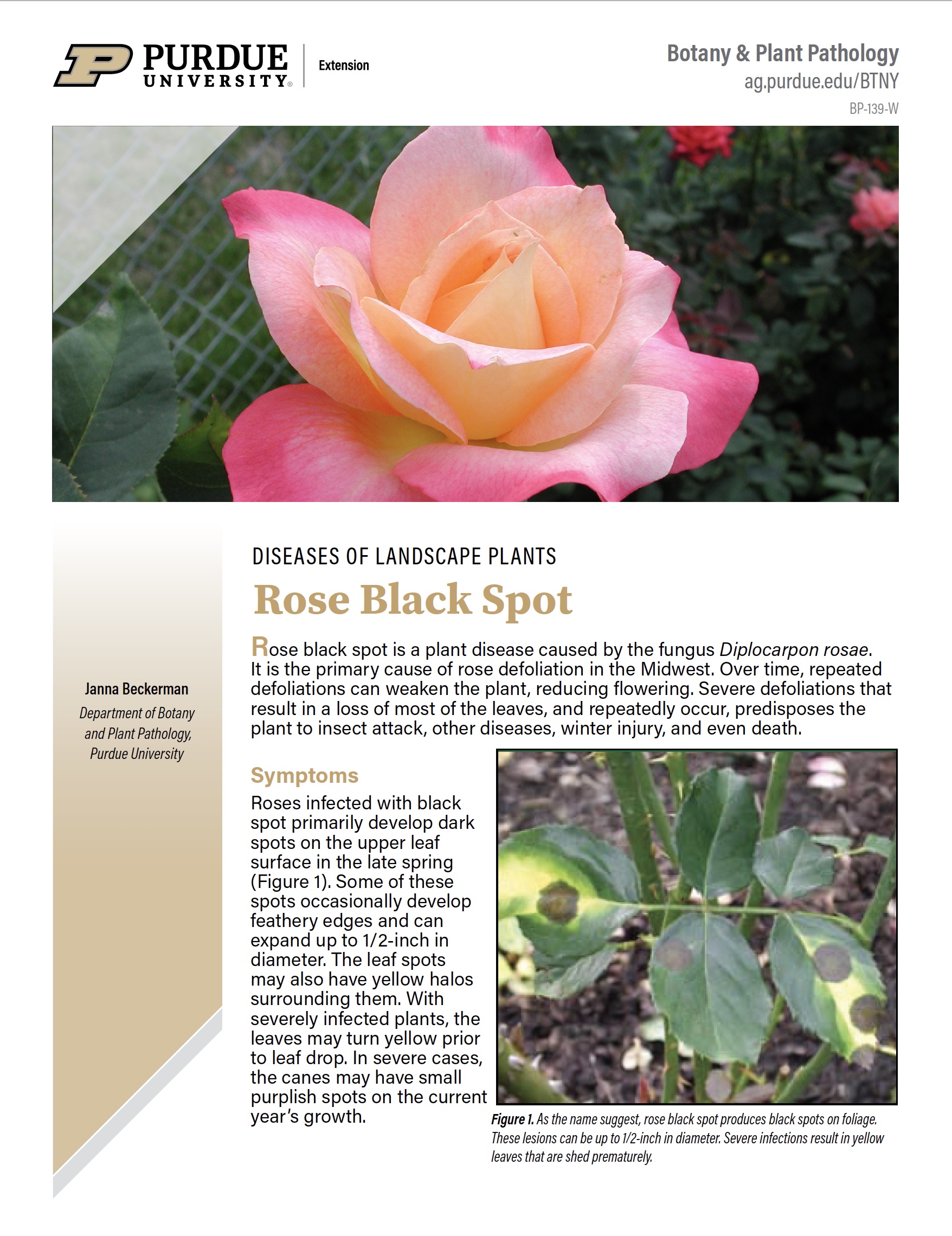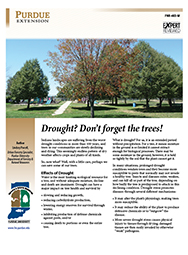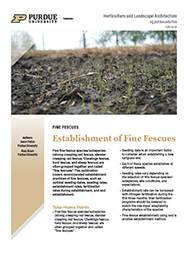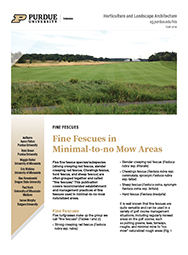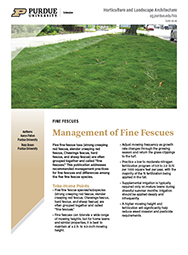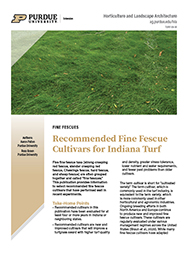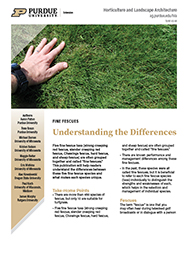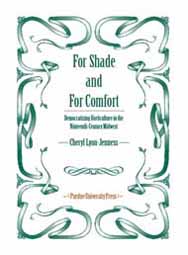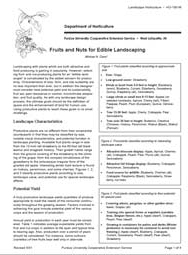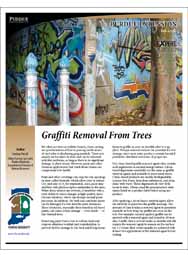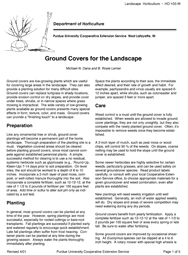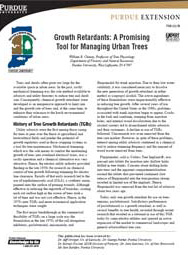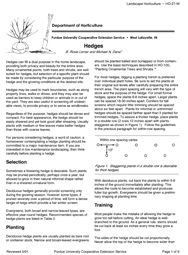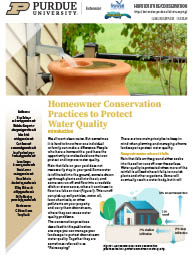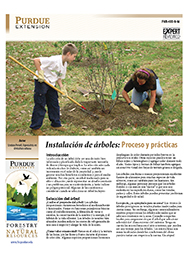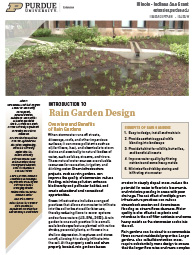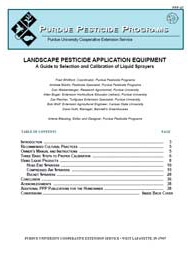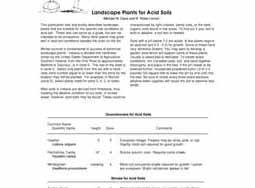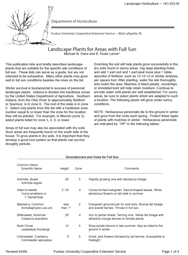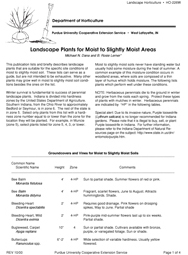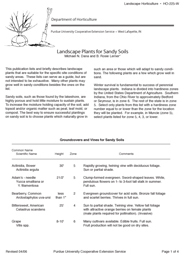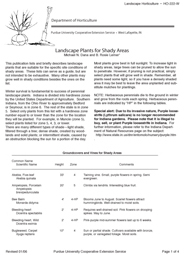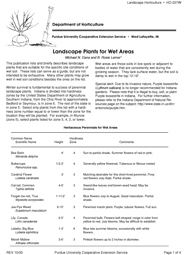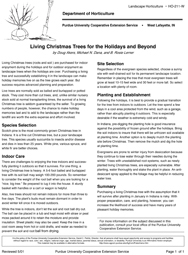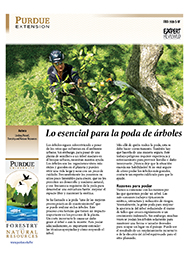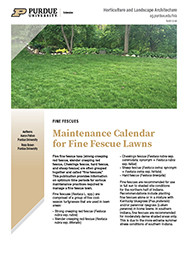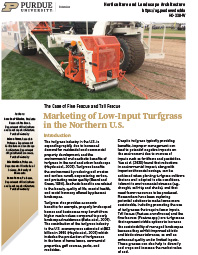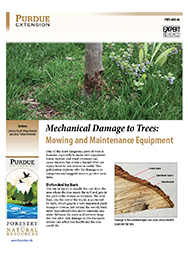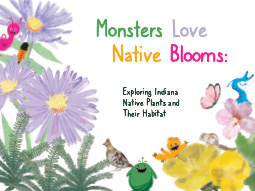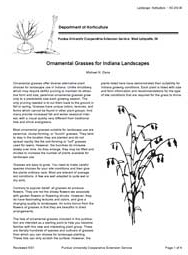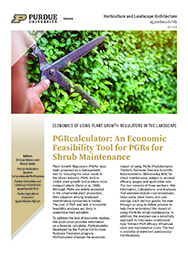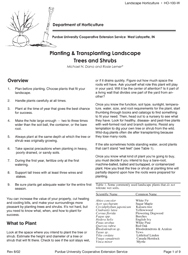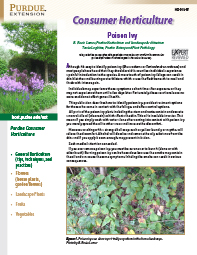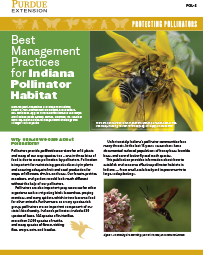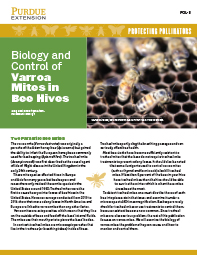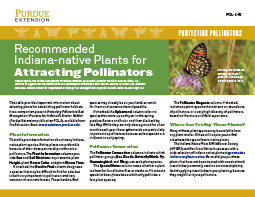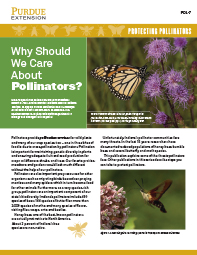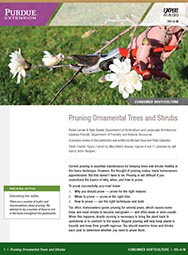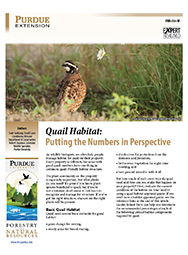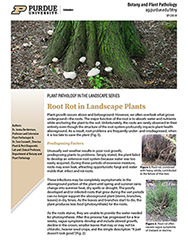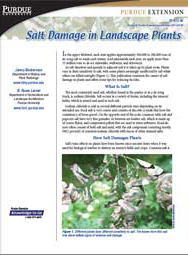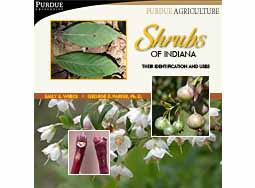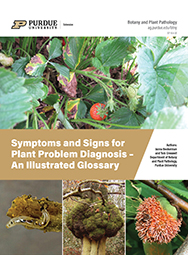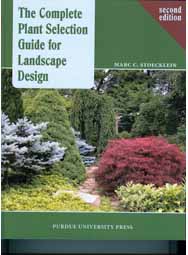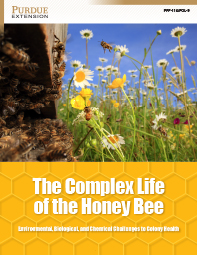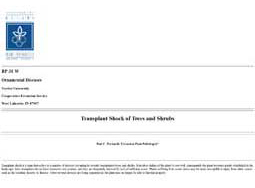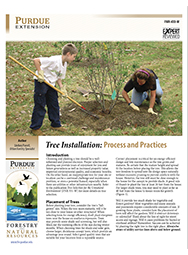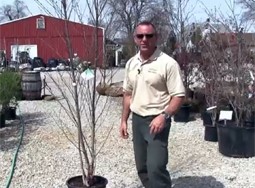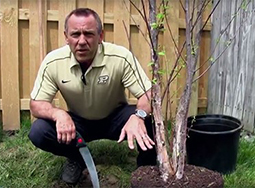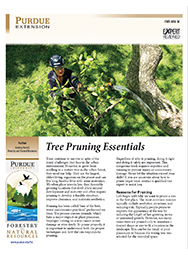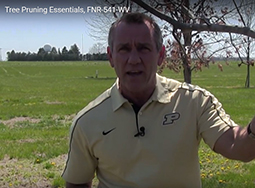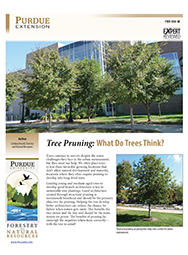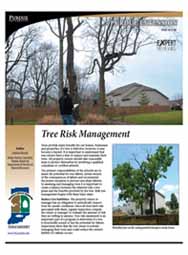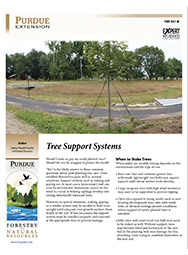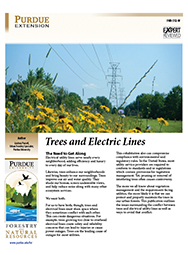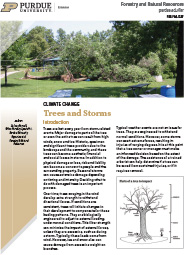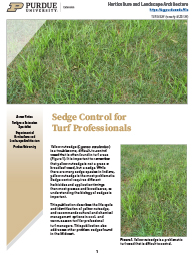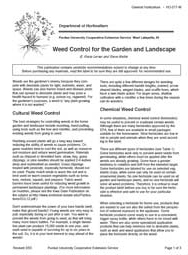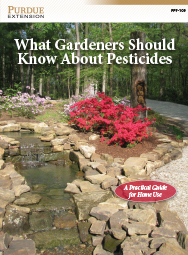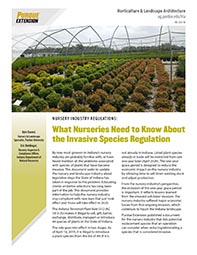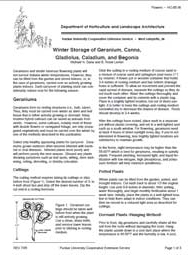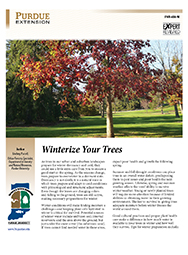Country Lifestyle
Landscaping
A partial cost analysis of using paclobutrazol for shrub maintenance
Labor is a large expense for the landscape services industry. This publication, the first in a three-part series, addresses the labor and dollar savings of applying plant growth regulators (PGRs) in three shrubs located ...
A problem weed: Controlling yellow nutsedge in lawns
This publication, formerly AY-19-W and updated in July 2021, describes the life cycle and identification of yellow nutsedge and recommends cultural and chemical management options for homeowners. A similar publication, T...
A sensitivity analysis of using Paclobutrazol for shrub maintenance
This publication is the second of three articles illustrating the economics of plant growth regulators (PGRs) in the landscape industry. Using a sensitivity analysis, two Purdue researchers analyze how changes in hourly ...
This publication provides a general guide to taking care of plants within the home, yard, lawn, and garden during the autumn months. ...
Commercial Greenhouse and Nursery Production: Alternative Options for Invasive Landscape Plants
This publication lists potential alternatives to some of the most notorious and damaging invasive plants commonly used in Indiana landscapes. Unlike other resources, this list includes both native and non-native species....
Commercial Greenhouse Production: Disease-resistant Annual and Perennial Production
One of the best ways to prevent serious plant disease outbreaks in the greenhouse, nursery, or landscape is to grow plants with demonstrated disease resistance. This publication describes disease resistance in plants, pr...
Consumer Horticulture: Collecting Soil Samples for Testing
A soil test will reveal the current nutrient status in your soils and whether you need to add any nutrients as fertilizer. This publication describes the best practices for when and how to sample your soils.
...Consumer Horticulture: Fertilizing Woody Plants
This publication examines the basics of why and how to fertilize woody plants in the home landscape.
Format: PDF
Pages: 10
Language: Engl...
Consumer Horticulture: Spreading Ornamental Plants: Virtues & Vices
This publication is a precautionary guide for gardeners who are choosing ornamental plants and may be considering plants that have a spreading habit. Formerly Purdue Extension publication HLA-1-W
Format...
Diagnosing Herbicide Injury on Garden Landscape Plants
Herbicides, when used properly, rarely cause problems on nontarget plants, but they can sometimes injure other plants. This publication examines the common causes of herbicide injury and how to avoid them....
Disease Management Strategies for Horticultural Crops: Using Organic Fungicides
When confronted with a disease, many say they prefer to use organic products because they are more environmentally friendly. Others say they just want to use a product that works, regardless of the ecological impact. Man...
Disease Resistant Annuals and Perennials in the Landscape
One of the best ways to prevent serious plant disease outbreaks is by choosing disease-resistant plants. This publication describes disease resistance in plants, provides management techniques to help avoid disease, and ...
Diseases of Landscape Plants: Rose Black Spot
Rose black spot is the primary cause of rose defoliation in the Midwest. Over time, repeated defoliations can weaken the plant, reducing flowering. This publication examines the causes of this disease and recommends ma...
Drought? Don't forget the trees!
Water is the most limiting ecological resource for a tree, and without adequate moisture, decline and death are imminent. Drought can have a major impact on tree health and survival. This 5-page PDF publication describ...
Fine Fescues - Establishment of Fine Fescues
Two Purdue experts discuss recommended establishment practices of five fine fescue species/subspecies (strong creeping red fescue, slender creeping red fescue, Chewings fescue, hard fescue, and sheep fescue) that are oft...
Fine Fescues - Fine Fescues in Minimal to no-Mow Areas
Some fine fescues are used in minimal-to-no-mow naturalized areas. This publication, by experts at five universities, covers recommended establishment, management practices and subtle differences among five species/subsp...
Fine Fescues - Management of Fine Fescues
In this publication, part of a series, two Purdue experts address recommended management practices and differences among five fine fescue species: strong creeping red fescue, slender creeping red fescue, Chewings fescue,...
Fine Fescues - Recommended Fine Fescue Cultivars for Indiana Turf
Which cultivar should you choose? This publication, by two Purdue experts, looks at five fine fescue cultivars that have been evaluated for four or more years in Indiana or neighboring states. For more in this series, se...
Fine Fescues - Understanding the Differences
Five fine fescue taxa (strong creeping red fescue, slender creeping red fescue, Chewings fescue, hard fescue, and sheep fescue) are often grouped together and called "fine fescues." In this publication, part of a series,...
For Shade and For Comfort: Democratizing Horticulture in the Nineteenth-Century Midwest (hardback)
Between 1850 and 1880, Americans of all ranks and circumstances planted shade trees, cultivated flower gardens, and established lawns with a new-found enthusiasm that both astonished and delighted horticultural advocates...
Fruits and Nuts for Edible Landscaping
Selecting fruits and nuts for an "edible landscape" is complicated by the added concern for productivity. The designer must consider total potential yield and sustainability, fruit set, pest resistance or control, microc...
This publication explains how paint and other graffiti materials can damage trees, and offers tips on how to safely remove them from bark and interior tree layers.
Urban Forestry, Department of Forestry & Natural R...
Ground Covers for the Landscape
This publication discusses the preparation, planting, and care for ground covers. The various ground covers are itemized according to their specific uses. ...
Growth Retardant: A Promising Tool for Managing Urban Trees
This publication discusses in detail the use of growth retardants on urban trees and shrubs that often grow too large for the available space in urban areas. ...
Homeowner Conservation Practices to Protect Water Quality
Anyone who has a home with a yard can help protect and improve water quality. This publication offers practical advice about reducing impervious surfaces, select proper landscape plants, effective management of lawns, in...
Instalacion de arboles: Proceso y practicas
This is a Spanish-language version of our helpful, how-to guide Tree Installation: Process and Practices, which helps in choosing, planting, and maintaining trees. It includes a 12-step planting process, Indiana ...
Introduction to Rain Garden Design
A rain garden is a green infrastructure project that can improve the quality of stormwater, minimize pollution, and enhance biodiversity and pollinator habitat. Purdue, Iowa State and Illinois-Indiana Sea Grant researche...
Landscape Pesticide Application Equipment: A Guide to Selection and Calibration of Liquid Sprayers
Homeowners strive for beautiful and productive lawns, and sometimes, despite using good cultural practices, pests get the upper hand. When using pesticides to control pests it's important to follow procedures and know ho...
Landscape Plants for Acid Soils
This publication lists and briefly describes landscape plants that are suitable for the specific site conditions of acid soil. These lists can serve as a guide, but are not intended to be exhaustive. ...
Landscape Plants for Areas with Full Sun
This publication lists and briefly describes landscape plants that are suitable for the specific site conditions of full sun. These lists can serve as a guide, but are not intended to be exhaustive. Many other plants may...
Landscape Plants for Moist to Slightly Moist Areas
This publication lists and briefly describes landscape plants that are suitable for the specific site conditions of moist to slightly moist soil. These lists can serve as a guide, but are not intended to be exhaustive. M...
Landscape Plants for Sandy Soils
This publication lists and briefly describes landscape plants that are suitable for the specific site conditions of sandy areas. These lists can serve as a guide, but are not intended to be exhaustive. Many other plants ...
Landscape Plants for Shady Areas
This publication lists and briefly describes landscape plants that are suitable for the specific site conditions of shady areas. These lists can serve as a guide, but are not intended to be exhaustive. Many other plants ...
Landscape Plants for Wet Areas
This publication lists and briefly describes landscape plants that are suitable for the specific site conditions of wet soil. These lists can serve as a guide, but are not intended to be exhaustive. Many other plants may...
Living Christmas Trees For The Holidays and Beyond
This publication discusses species selection, indoor care, site selection, and planting and establishment for using live trees for the holidays. ...
Lo esencial para la poda de árboles
Se ha llamado a la poda "una de las mejores peores prácticas de mantenimiento" que se puede realizar en los árboles. Este proceso crea heridas que tienen un impacto importante en los procesos de la planta. U...
Maintenance Calendar for Fine Fescue Lawns
Five fine fescue taxa (strong creeping red fescue, slender creeping red fescue, Chewings fescue, hard fescue, and sheep fescue) are often grouped together and called "fine fescues." In this publication, part of a series,...
Marketing of Low-Input Turfgrass in the Northern US
Using data from a web-based survey of sod buyers, Purdue researchers investigate marketing opportunities and barriers for fine fescue and tall fescue sod. Their conclusions include the importance of the role that sod gro...
Mechanical Damage to Trees: Mowing and Maintenance Equipment
One of the most dangerous pests of trees is humans, especially humans with equipment. Lawn mowers and weed trimmers can cause injuries that create a hazard when an injury leads to tree disease or death. This publication ...
Monsters Love Native Blooms: Exploring Indiana Native Plants and Their Habitat
This 22-page childrens book by Purdue University students helps young readers learn about 12 plants native to Indiana, focusing on where they live and thrive (prairie, forest, forest edge, water edge) and the role of lan...
Ornamental Grasses for Indiana Landscapes
This publication includes lists of ornamental grasses intended as a starting point to help you become familiar with ornamental grasses. ...
PGRcalculator: An economic feasibility tool for PGRs for shrub maintenance
Plant Growth Regulators (PGRs) can be a management tool for reducing labor needs in the Green Industry. Building on the two other publications in this series, Purdue researchers present four analyses that show how PGRs c...
Planting & Transplanting Landscape Trees and Shrubs
This publication discusses plant selection, timing, preplant operations, planting instructions, pruning, staking and guying, trunk wrapping, watering, and transplanting of landscape trees and shrubs. Tables are provid...
This publication describes how to identify poison ivy, provides treatment options for those who come in contact with the foliage, and offers control options.
Format: PDF.
Pages:
Possum in the Pawpaw Tree: A Seasonal Guide to Midwestern Gardening (Paperback)
Inspired by actual gardeners' inquiries, each chapter deals with such down-to-earth subjects as when to start seeds, why plants might fail to bloom, pruning techniques, identifying and controlling common pests, home f...
Protecting Pollinators: Best Management Practices for Indiana Pollinator Habitat
This publication provides information about how to establish and conserve effective pollinator habitats in Indiana - from small-scale backyard improvements to large-scale plantings.
Format: Bo...
Protecting Pollinators: Biology and Control of Varroa Mites in Bee Hives
This publication describes varroa mites and their effects on honey bee hives. It also recommends monitoring and management practices to protect hives against this pest.
Format: Booklet, PDF, an...
Protecting Pollinators: Recommended Indiana-native Plants for Attracting Pollinators
This publication provides a list of recommended plants that homeowners and others can use to establish and conserve effective pollinator habitats in Indiana - from small-scale backyard improvements to large-scale plan...
Protecting Pollinators: Why Should We Care About Pollinators?
This publication explains some of the threats pollinators face. Other publications in the Protecting Pollinators series describe steps you can take to protect pollinators.
Format: Booklet, PDF,...
Pruning Ornamental Trees and Shrubs
Correct pruning is essential maintenance for keeping trees and shrubs healthy in the home landscape. However, the thought of pruning makes many homeowners apprehensive. But this doesn't have to be. This publication re...
Quail Habitat: Putting the Numbers in Perspective
As wildlife biologists, we often help people manage habitat for quail on their property. Every property is different, but areas with good quail numbers have one thing in common: quail-friendly habitat structure. The p...
Root problems in plants are frequently under- and misdiagnosed. Sometimes it's too late to save the plant. This publication, part of the Plant Pathology in the Landscape series, discusses predisposing factors, diagnosis,...
Salt Damage in Landscape Plants
Salts used to de-ice roads and sidewalks can injure and even kill many different landscape plants. This publication examines the causes of salt damage in plants and offers some tips for reducing its risks. This replaces ...
As the definitive identification guide to the shrubs and woody vines of Indiana, this book also provides coverage of 90% of the species to be found in surrounding Midwestern US states. As well as covering indigenous spec...
Shrubs of Indiana: Their Identification and Uses
Indiana is home to more than 100 species of shrubs that are native to the state and the Midwest. Inspired by the work of pioneer botanist Charles Deam, Shrubs of Indiana provides:
- detail...
Symptoms and Signs for Plant Problem Diagnosis - An Illustrated Glossary
Pests, pathogens and abiotic disorders cause a variety of problems in plants but how do you describe them? This full-color, illustrated guide will help users learn the language of plant problem diagnosis by defining the ...
The Complete Plant Selection Guide for Landscape Design
In this paperback, 750-page book, the author has created a quick and easy-to-use reference guide for choosing plant material for landscape designs. This reference manual includes comprehensive lists with search criteria ...
This publication, which is part of the Protecting Pollinators series, explains the complex biology of honey bees. It also explores the roles pesticides may play in bee health, examines the latest knowledge in this fas...
Tree Installation: Process and Practices
Choosing and planting a tree should be a well-informed and planned decision. Proper selection and planting of urban trees can provide years of enjoyment for you and future generations as well as increased property val...
Tree Planting Part 1: Choosing a Tree
Choosing and planting a tree should be a well-informed and planned decision. Proper selection and planting of urban trees can provide years of enjoyment for you and future generations as well as increased property value,...
Tree Planting Part 2: Planting Your Tree
Trees and all forestlands are major assets to our cities, towns, and communities. Urban trees, in particular, provide aesthetic, functional, and environmental benefits to improve the quality of life. A well-planted an...
Pruning has been called "one of the best, worst maintenance practices" performed on trees. The process creates wounds, which have a major impact on plant processes. Improper cutting on a tree causes severe damage or even...
Pruning has been called "one of the best, worst maintenance practices," especially when performed on urban trees. The process creates wounds, which have a major impact on plant processes. Improper cutting on a tree cause...
Tree Pruning: What Do Trees Think?
This 6-page publication explains the physiological and physical changes that happen within trees as a response to pruning. Guiding young and medium-aged trees to develop good branch architecture is key to sustainable ...
This publication outlines the steps for assessing and inspecting trees, in order to reduce the risk of unhealthy trees falling and damaging property. Topics covered include documenting and maintaining records, inspection...
Tree Support Systems answers common questions about post-planting tree care. It describes when to stake trees, how to stake and guy trees, and proper methods of trunk protection.
Trees establish themselves qui...
Electrical utility lines serve nearly every neighborhood, adding efficiency and luxury to every day of our lives. Likewise, trees enhance our neighborhoods and bring beauty to our surroundings. Trees improve our air and ...
Trees are lost or seriously damaged every year from high winds, snow, ice and other storm-related weather. This publication explains common tree injuries and how to identify them, risk assessment when trees are damaged a...
Turfgrass Management: Sedge Control for Turf Professionals
This publication, formerly AY-338-W and updated in July 2021, describes the life cycle and identification of yellow nutsedge, and recommends cultural and chemical management options in cool- and warm-season turf for prof...
Weed Control for the Garden and Landscape
This publication discusses precautions, label clearance, walks, patios, drives, and vegetable gardens. Tables are included listing the non-selective and selective weed killers, vegetables, fruits and nuts, flowering an...
What Gardeners Need to Know About Pesticides
Effective pest control in the landscape and garden requires more than just spraying away the problem. Successful gardeners understand that managing insects, weeds, diseases, and vertebrate pests starts with selecting, pl...
What Nurseries Need to Know About the Invasive Species Regulation
This publication, by Purdue University and the Indiana Department of Natural Resources, informs the nursery and landscape industry about new state regulations regarding invasive plant species. The rules are effective ...
Winter Storage of Geranium, Canna, Gladiolus, Caladium, and Begonia
This publication discusses the proper winter storage methods for geraniums, cannas, dahlias, gladioli, and caladiums and tuberous begonias. Illustrations are included on the tuberous flowering plants. ...
As trees in our urban and suburban landscapes prepare for winter dormancy and cold, they could use a little extra care from you to ensure a good start in the spring. This three-page PDF gives you tips on things you can d...









